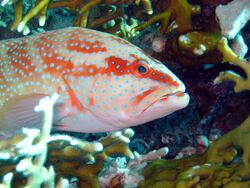Biology:Cephalopholis hemistiktos
| Cephalopholis hemistiktos | |
|---|---|

| |
| Juvenile | |
| Scientific classification Error creating thumbnail: Unable to save thumbnail to destination
| |
| Domain: | Eukaryota |
| Kingdom: | Animalia |
| Phylum: | Chordata |
| Class: | Actinopterygii |
| Order: | Perciformes |
| Family: | Serranidae |
| Subfamily: | Epinephelinae |
| Genus: | Cephalopholis |
| Species: | C. hemistiktos
|
| Binomial name | |
| Cephalopholis hemistiktos (Ruppell, 1830)
| |

| |
| Synonyms | |
| |
Cephalopholis hemistiktos, the yellowfin hind, is a species of marine ray-finned fish, a member of the family Serranidae, which also includes the anthias and sea basses. This species is found from the Red Sea to the Persian Gulf and the coast of Pakistan. A single specimen was filmed in 2009 in the Mediterranean Sea, off Malta.[2]
Habitat
This species is most commonly found in coral assemblages at depths slightly exceeding 50 metres, but can also be found in rocky regions. It may grow up to 35 centimetres in length.
Description
It has 9 spines and 14 soft rays on its dorsal fin,[3] and is deep red in colour. The margins of the fish’s pectoral fins are yellow, being its namesake. The mouth of the hind has four “canine” teeth, used to grip and seize prey
References
- ↑ Choat, J.H. (2018). "Cephalopholis hemistiktos". IUCN Red List of Threatened Species 2018: e.T132759A46628916. doi:10.2305/IUCN.UK.2018-2.RLTS.T132759A46628916.en. https://www.iucnredlist.org/species/132759/46628916. Retrieved 3 December 2022.
- ↑ Atlas of Exotic Fishes in the Mediterranean Sea (Cephalopholis hemistiktos). 2nd Edition. 2021. 366p. CIESM Publishers, Paris, Monaco.https://ciesm.org/atlas/fishes_2nd_edition/Cephalopholis_hemistiktos.pdf
- ↑ "Qatar e-Nature – Yellowfin Hind". https://www.enature.qa/specie/yellowfin-hind/.
Wikidata ☰ Q2068264 entry
 |



